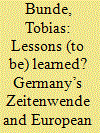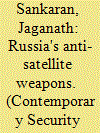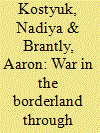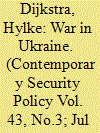|
|
|
Sort Order |
|
|
|
Items / Page
|
|
|
|
|
|
|
| Srl | Item |
| 1 |
ID:
186554


|
|
|
|
|
| Summary/Abstract |
This article proposes an identity-based analysis of the Russian position in the global debate on autonomous weapons systems (AWS). Based on an interpretation of Russian written and verbal statements submitted to the United Nations Convention on Certain Conventional Weapons (CCW) meetings from 2014 to 2022, I find that two key integral elements of Russian great power identity—the promotion of multipolarity and the recognition of Russia’s equal participation in global affairs—guide its evolving position on the potential regulation of AWS. The analysis makes an empirical contribution by examining one of the most active participants in the CCW discussion, an opponent to any new regulations of so-called “killer robots,” and a developer of autonomy in weapons systems. It highlights the value of a more thorough understanding of the ideas guiding the Russian position, assisting actors who seek a ban on AWS in crafting their responses and strategies in the debate.
|
|
|
|
|
|
|
|
|
|
|
|
|
|
|
|
| 2 |
ID:
186560


|
|
|
|
|
| Summary/Abstract |
In Germany, the Russian war on Ukraine is widely perceived as a “Zeitenwende,” a watershed moment undermining key foreign policy beliefs. Despite mounting evidence contradicting them, German elites previously failed to adapt core beliefs regarding Russia and the use of force because these beliefs were not only deeply embedded in largely uncontested identity constructions but also shaped the definition of economic interests, which in turn made ideational adaptation more costly. Moreover, Germany’s extraordinarily beneficial geopolitical situation in the post-Cold War era meant that the country could afford not to learn. Although the “Zeitenwende” will trigger significant change, it is unclear which lessons exactly Germans will now be learning and how far that adaptation will go. Given Germany’s key position in Europe and its previous role in shaping the European and transatlantic policy toward Russia, the results of these learning processes will significantly shape the emerging European security order.
|
|
|
|
|
|
|
|
|
|
|
|
|
|
|
|
| 3 |
ID:
186555


|
|
|
|
|
| Summary/Abstract |
Russia has recently tested several anti-satellite weapons. The Russian military literature reveals hedging and offsetting strategies behind these actions. First, Russians cast their weapons as a mirror response to American experiments. Russians fear a technological surprise and suggest that their experimentation hedges against significant advantages that may accrue to the United States from dominating space. Second, Russians perceive satellites providing vital targeting and navigation information as crucial enablers of U.S. and NATO aerospace precision strike weapons. Therefore, dependence on space-based assets is a vulnerability that Russia cannot fail to take advantage of in a crisis to offset U.S. and NATO military superiority. Some unilateral measures such as deploying cheaper and distributed small satellite constellations can reduce U.S. and allied vulnerabilities. Bilateral behavioral norms can offer reassurances to both the United States and Russia. However, deeper regulation and limits on emerging strategic aerospace weaponry may also be required.
|
|
|
|
|
|
|
|
|
|
|
|
|
|
|
|
| 4 |
ID:
186561


|
|
|
|
|
| Summary/Abstract |
Following Russia’s invasion of Ukraine, the EU has taken dozens of decisions, on which agreement had hitherto been unthinkable due to differences between member states. A norms-based approach is used to better understand the EU’s unexpected agreement on two key measures: the sanctions packages against Russia and the decision to allow Ukrainian nationals the right to live and work in the EU. Congruence among member states over the responsibility to protect Ukrainian civilians from atrocity crimes and war crimes played an important role, including the obligations to react (sanctions) and to prevent (refugee protection). EU actions arising from moral obligations based on rights-based norms have been linked closely to values-based norms pertaining to EU solidarity, identity, and ethical obligations vis-à-vis fellow Europeans. These preliminary findings matter as they suggest an inextricable linkage between rights-based norms and values-based norms to trigger effects on EU foreign policy.
|
|
|
|
|
|
|
|
|
|
|
|
|
|
|
|
| 5 |
ID:
186559


|
|
|
|
|
| Summary/Abstract |
Prior to the onset of Russia’s invasion of Ukraine, experts predicted an extensive cyber conflict. However, to date the scale of known cyberattacks has been quite modest. Pundits suggest that Ukraine’s improved cyber defenses, which it developed through its close cooperation with Western partners, is one of the possible explanations for Russia’s limited cyber front. This article interrogates this claim, outlining two plausible reasons for the limited effectiveness of Ukraine’s cyber defenses in the Kremlin’s limited cyber front. First, despite an extensive outpouring of cyber knowledge and expertise from the West, Ukraine’s cyber capabilities are still organizationally and operationally underdeveloped. Second, limited fungibility of cyber capabilities complicates interoperability between any joint operations and diminishes the West’s willingness to share their time-limited cyber tools with Ukraine. By explaining the challenges of interstate cooperation in the cyber domain, this article contributes to the literature on the role of alliances in modern warfare.
|
|
|
|
|
|
|
|
|
|
|
|
|
|
|
|
| 6 |
ID:
186556


|
|
|
|
|
| Summary/Abstract |
On February 24, 2022, Russia invaded Ukraine. After the 2008 war in Georgia, the 2014 annexation of Crimea, and the continuous conflict in Donbas for nearly eight years, Russia's massive military buildup in the fall of 2021, including in Belarus, the actual invasion should not have come as a surprise. For many of us, it did. And the hostility and brutality since have been shocking.
|
|
|
|
|
|
|
|
|
|
|
|
|
|
|
|
| 7 |
ID:
186557


|
|
|
|
|
| Summary/Abstract |
The global rules-based order has been in transformation for more than a decade, whilst the liberal international order has been in crisis and new international orders are emerging. Within this context, the Russian invasion of Ukraine marks what the Germans have called a Zeitenwende because the multi-order world is now a reality. The article outlines the main characteristics and implications of a multi-order world and outlines four categories of orders that will populate the multi-order world. The article details Putin’s vision for a Eurasian order and how his plans are received within the Eurasian order. The article offers a perspective on how the global dynamics of the new multi-order world might play out, showing that it is likely to be conflictual rather than a cooperative, and that members of the Eurasian order show little enthusiasm for Putin’s vision, resulting in an order held together by force rather than consent.
|
|
|
|
|
|
|
|
|
|
|
|
|
|
|
|
| 8 |
ID:
186558


|
|
|
|
|
| Summary/Abstract |
This article explores Russia’s attack on Ukraine using the lens of strategic culture. Specifically, two strands in Russian strategic culture are identified. The first is a deep-seated sense of vulnerability, especially vis-à-vis “the West.” To counter this perceived threat, Russia’s national security establishment has long emphasized the importance of possessing strategic depth and buffer zones. The second strand revolves around a feeling of entitlement to great power status. A central component in Russia’s great power vision is the right to have a sphere of influence in its Eurasian neighborhood. The article shows that Kremlin officials perceived Ukraine’s drift toward the West as a major threat to both Russia’s security interests and its status aspirations. As a result, Russia’s rhetorical milieu regarding Ukraine became increasingly radicalized. The article concludes that this provided the discursive and intellectual habitat that enabled Putin to launch a large-scale attack.
|
|
|
|
|
|
|
|
|
|
|
|
|
|
|
|
|
|
|
|
|